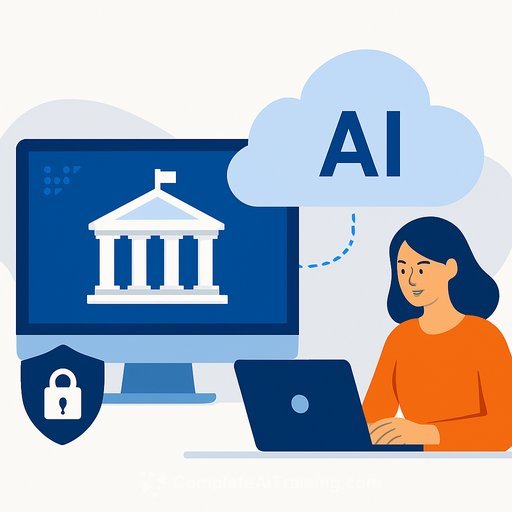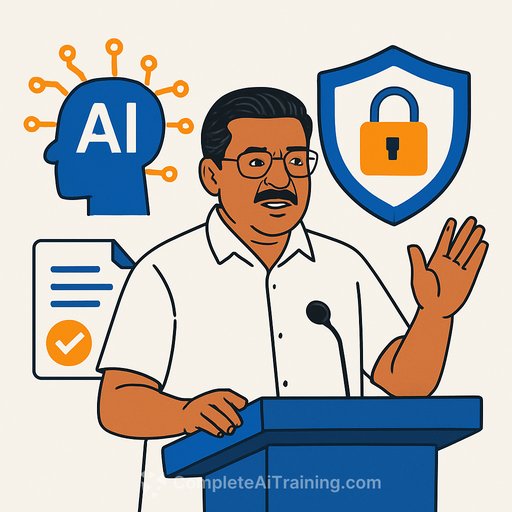Albania's AI "Minister" Diella: Promise, Optics, and the Hard Work Ahead
October 24, 2025
Albania has introduced Diella, billed as the first artificial intelligence minister, to oversee public procurement. She appeared as a projection in traditional white dress at the opening of the country's 11th Legislature, stating, "I am not here to replace people but to help them. True, I have no citizenship, but I have no personal ambition or interests either."
The move is meant to speed procurement decisions and send a clear signal against corruption as Albania seeks progress toward EU membership. It also raises obvious questions: Who is accountable for an algorithm's decisions, and how do you keep a digital official from becoming a political prop?
Diella was developed earlier this year with Microsoft and first launched as a chatbot on the e-Albania platform to help citizens request documents and use digital services. Turning a service into a political figure is new-even for governments that are already deep into automation. You can see the original service here: e-Albania.
Local academics are split. "Diella mostly represents the desire to appear in line with new technological innovations while simultaneously pursuing EU membership," says Klodiana Beshku, associate professor at the University of Tirana. "It is supposed to deal with public contracts in a neutral way, but the real question is why finding an honest minister to deal with public procurement is such a mission impossible in Albania."
Why this matters for public-sector leaders
Procurement is where money, influence, and risk concentrate. AI can score bids, detect anomalies, and reduce cycle times. But without clear accountability, procurement law, and transparent oversight, the same tool can erode trust faster than it saves time.
Governance questions to resolve before deploying an "AI minister"
- Decision rights: What decisions can the system make on its own versus recommend? Who signs the final approval?
- Accountability: If the system "makes a mistake," which office is responsible in law, in practice, and in public?
- Appeals: How can suppliers challenge automated outcomes? What is the service-level target for reviews?
- Audit trail: Are prompts, model versions, data sources, and outputs logged and preserved for discovery?
- Data governance: What datasets train and inform the model? Are they current, lawful to use, and bias-tested?
- Security: How are model weights, prompts, and procurement data protected from leaks and prompt injection?
- Vendor dependence: What happens if the provider changes terms, pricing, or model behavior?
- Transparency: What is disclosed to bidders and the public without exposing sensitive information?
Implementation guardrails that reduce risk
- Human-in-the-loop: Mandatory human sign-off for awards, exclusions, and any high-impact classification.
- Policy first: Publish a short, plain-language charter that defines scope, limits, and prohibited uses.
- Thresholds: Set conservative confidence thresholds. Route edge cases to human review by default.
- Independent oversight: Establish an external audit panel with authority to suspend the system if needed.
- Red-team and test: Attack the system before launch; repeat after each model update or rules change.
- Incident response: Predefine procedures for pausing the system, notifying stakeholders, and remediating harm.
- KPIs that matter: Track cycle time, dispute rate, audit findings, supplier diversity, and cost savings-publish quarterly.
- Procurement sandbox: Pilot on low-risk categories before touching large, sensitive contracts.
- Whistleblower channel: Provide protected reporting for staff and suppliers who spot issues.
Albania's political context
Brussels has pushed for rule-of-law improvements, especially in public administration, as a condition for progress on EU talks. Expect close attention to whether Diella improves transparency or just rebrands existing processes. For background on EU enlargement, see the European Commission's page: EU Enlargement.
Opposition parties in Albania call the move theater and worry the persona can be steered by whoever controls it. That concern is practical: models are updated, prompts are edited, and guardrails can be loosened quietly unless change control is public and enforceable.
What to watch next
- Legal basis: Any legislation defining Diella's status, liability, and audit requirements.
- Publication of rules: Procurement policies, model cards, and version histories made public.
- Results over rhetoric: Fewer delays, fewer disputes, cleaner audits-measured and published.
- Supplier experience: Clear guidance, faster support, and a functioning appeals process.
- EU feedback: Whether independent assessments see real rule-of-law gains or just rebranding.
AI can help clean up procurement, but titles do not fix incentives. Clear rules, strong oversight, and visible results do.
If your department is exploring similar tools, a practical starting point is building skills across policy, data, and procurement teams. See curated options here: Complete AI Training: Courses by Job.
Your membership also unlocks:






